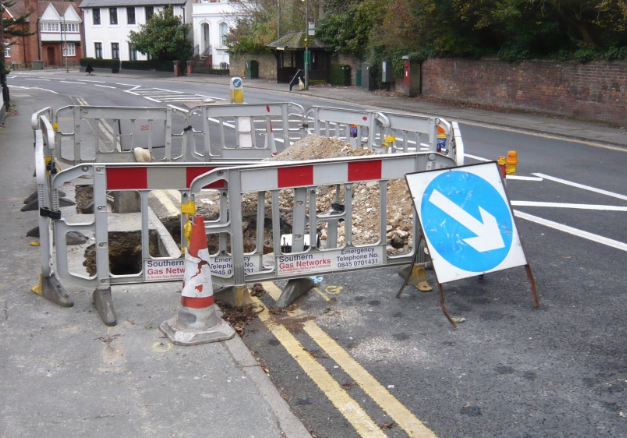 Abraham Lincoln
If given the truth, the people can be depended upon to meet any national crisis...
Abraham Lincoln
If given the truth, the people can be depended upon to meet any national crisis...
 Guildford news...
for Guildford people, brought to you by Guildford reporters - Guildford's own news service
Guildford news...
for Guildford people, brought to you by Guildford reporters - Guildford's own news service
Utility Companies Should Be Charged Daily Rate For Roadworks
Published on: 15 Aug, 2016
Updated on: 20 Aug, 2016
 Tough new powers are being called for by councils to ease traffic chaos caused by some utility companies digging up roads.
Tough new powers are being called for by councils to ease traffic chaos caused by some utility companies digging up roads.
The Local Government Association (LGA), which represents more than 370 councils in England and Wales, is calling for urgent action from the government to stop some areas of the country facing gridlock.
The LGA wants it to be easier for councils to be able to introduce “lane rental schemes”, without the requirement to get approval from the Secretary of State for Transport, a cumbersome and bureaucratic process.
The lane rental scheme means utility companies, such as gas, water and cable providers, are charged a daily rate for work carried out on key congested roads during busy periods, such as rush hour, to motivate companies to finish roadworks faster.
Revenue raised from lane rental charges would be used by councils to fund measures which help to reduce future road works disruption. Currently, Transport for London (TfL) and Kent County Council have been the only ones granted approval to run lane rental schemes.
In just the two years since the scheme was introduced in London, it has cut serious and severe disruption from roadworks by almost half. There are also incentives in the lane rental scheme to ensure utility companies get it right first time. Companies that do a shoddy job can be compelled to redo the work – paying lane rental prices again.
Currently 2.5 million road openings a year are caused by utility companies. LGA research shows that three quarters of small businesses say this work has a “negative impact” – mainly in reduced sales.
Nationally, roadworks cost the taxpayer about £250 million annually, which would fill in around four million potholes. Councils spend nearly a fifth of their maintenance budgets – £220 million – on tackling poorly done utility streetworks, which reduce road life by up to a third.
Latest Government figures show the country is on the fast-lane to gridlock and forecast an increase in traffic levels of up to 55 per cent by 2040.
LGA Transport spokesman Cllr Peter Box said: “Councils want to do everything they can to help motorists and small businesses by minimising disruption. We have all experienced the boiling frustration of being stuck in rush hour gridlock or had headaches from deafening roadworks nearby.
“Many of our towns and cities could face gridlock at rush-hour unless robust and decisive action is taken right now.
“However, local authorities are being hamstrung by a lack of effective powers to tackle this issue head on. Councils know their areas best and should be able to make decisions about traffic locally. This means they need the option of being able to introduce lane rental schemes without Secretary of State approval, which is time-consuming and bureaucratic.
“With the increasing demand for new and upgraded services and an ageing utility infrastructure there needs to be powerful incentives to ensure utility companies carry out necessary work in the most effective way with the absolute minimum of disruption. The lane rental scheme has been proven to provide this for key roads in London and Kent.”
County councillor Fiona White, (Lib Dem, Guildford West) said: “I was pleased to see the suggestion from the LGA that local authorities should get more powers in relation to utility roadworks. Anything which limits the disruption is to be welcomed.
I don’t think that local authorities make enough of the powers they already have. In my experience, they do not go back to inspect the standard of reinstatement by utility companies with the result that poor work is not identified soon enough and the county council has to do remedial work to make good. The cost of that remedial work falls on council taxpayers and reduces the money available for much needed road repairs and improvements”.
Recent Articles
- Burglar Jailed Thanks To Quick Action of Ash Resident
- Highways Bulletin for December
- Birdwatcher’s Diary No.318 Some Pre-Christmas Rambles
- Merry Christmas and a Happy New Year to All Our Contributors and Readers!
- More Units Added to Solums’s Station Redevelopment
- Vehicle Stop on Epsom Road Leads to Prolific Drug Gang Being Put Behind Bars
- Local Political Leaders Respond to Publication of the English Devolution White Paper
- Flashback: Guildford All Lit Up For Christmas – Then And Now
- City Earn Themselves a Three Point Christmas Present
- Mayor’s Diary: December 23 – January 4


Search in Site
Media Gallery
Dragon Interview: Local Artist Leaves Her Mark At One of England’s Most Historic Buildings
January 21, 2023 / No Comment / Read MoreDragon Interview: Lib Dem Planning Chair: ‘Current Policy Doesn’t Work for Local People’
January 19, 2023 / No Comment / Read MoreA3 Tunnel in Guildford ‘Necessary’ for New Homes, Says Guildford’s MP
January 10, 2023 / No Comment / Read More‘Madness’ for London Road Scheme to Go Ahead Against ‘Huge Opposition’, Says SCC Leader
January 6, 2023 / No Comment / Read MoreCouncillor’s Son Starts Campaign for More Consultation on North Street Plan
December 30, 2022 / No Comment / Read MoreCounty Council Climbs Down Over London Road Works – Further ‘Engagement’ Period Announced
December 14, 2022 / No Comment / Read MoreDragon Interview: GBC Reaction to the Government’s Expected Decision to Relax Housing Targets
December 7, 2022 / No Comment / Read MoreHow Can Our Town Centre Businesses Recover? Watch the Shop Front Debate
May 18, 2020 / No Comment / Read More












Recent Comments